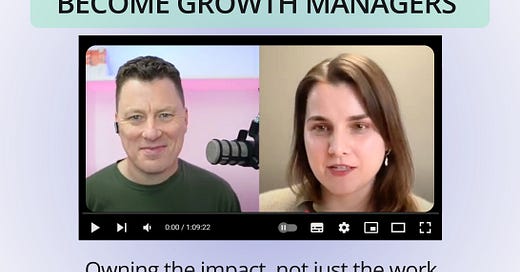From project to product to growth: the messy path in between
I didn’t study product management.
No one did back in 2013.
At the time, I was working in Malaysia, deep in Customer Lifetime Value (literally, I was the person responsible for the LTV) and setting up and improving NPS at Mindvalley. Net Promoter score, remember the "On a scale from 0 to 10 how likely are you to recommend [product] to your friends or colleagues?". That one. Then someone called what I did “product,” and suggested I moved teams. I blinked twice and opened Google.
Turns out, it was a thing. A big thing. A better-paying-than-project-management-and-anything-else-available-to-me-back-then thing.
But the definitions were all over the place.
Though everyone seemed to agree on this:
A product manager is someone who gets development done in an agile way, talks to people at all levels, manages drama, and is great with slides1.
Sound familiar?
How it started
I got curious. Turned out, back then we were having a mix of a Product Manager and Scrum Product Owner, only without the ownership bit.
So I opened my phone, found a bunch of apps I used and applied to those that had a PM role open — and one company responded: Booking.com.
I didn’t get the job back then.
But I got something better: feedback. Real, clear, useful feedback—and, more importantly, clarity on what the PM job really was and what I was missing to become a 'real one'.
So I:
studied up,
earned Scrum Product certifications,
and within 6 months landed a 'real' PM role at another startup.
Less than a year later?
Booking called back.
(I had receipts. I had done the work.)
Fast-forward to now: what even is a Product Manager anymore?
More than a decade in, and I still get puzzled looks when I explain what I do.
But recently, I've started hearing more and more talk about 'the end of Product Management'2 and the emergence of 'Head of Growth’ and ‘Growth manager' roles. Not the marketing ones, the product ones.
PMs are now expected to own growth.
Not just shipping features.
Not just running roadmaps.
Not just… delivering.
But truly understanding how their work impacts revenue, retention, activation—whatever makes the business succeed.
I spoke to Jason Knight3—fellow product solopreneur and host of the 'One Knight in Product' podcast—about this during our conversation. We unpacked it on his show too, and I’ll say it here again:
PMs need to stop thinking of themselves as delivery managers and start thinking like revenue enablers.
Why this shift matters
Because the world has changed.
Companies are leaner. Budgets are tighter. Results matter more than ever.
And if you’re a PM who can’t explain how your product work connects to revenue or user growth?
You’re at risk.
I’ve mentored startups where the only thing they care about is:
Can this person help us grow?
Can this feature move the needle?
Not: Did you use the right framework? or How are the OKRs doing?
A good PM today? Adds a dollar sign to everything:
That bug fix? Saves customer support hours = saves $$.
That new feature? Enables recurring $$ from a new user segment.
That internal tooling project? Unlocks team capacity = lets you do more with fewer people = $$$.
Everything can be translated into business value. Time, people, even decisions not taken — it all comes with a price tag.
You don’t need to be in Finance, but you do need to think like an owner. Because when you do — you’ll not only grow your product, you’ll grow yourself right along with it.
Learnings from the field
PM/PO ≠ Project Manager.
It never was. But we’ve let the term get messy. Time to clean it up.Growth isn’t a department.
It’s a mindset. You can work on internal tools and still be a growth PM—if you know how your work impacts the business.You’re allowed to evolve.
I went from process geek to growth advisor. The through line? Asking “why are we doing this?” and not stopping at “because the roadmap says so.”
What I’m doing now
Helping B2C teams fix onboarding and grow LTV (full-circle back to LTV!)
Coaching growth teams to get to performing mode
Speaking more (podcast ep just dropped!)
Launching an ebook on onboarding (early access here)
Final note
If you're a PM looking around wondering, “What’s next?” — maybe it’s not another framework. Or another job.
Maybe it’s a mindset shift.
What if you started treating your role the way a solopreneur treats their business? Look at every decision through the lens of impact — especially the kind that’s measurable in $$.
You don’t need to hustle harder. You need to start thinking like someone who owns the outcome.
That’s how you become indispensable. That’s how you grow.
I still prefer the original Scrum definition of "Adding value by removing impediments" — I just grew to have a very broad definition of 'impediments'.
The podcast with Jason where we spoke about the PMs turning into Growth Managers.







